经商和道德BusinessandEthics(大学英语作文)
商业道德的英语作文

Business ethics are the moral principles and values that guide the behavior and decisionmaking of individuals and organizations in the business world. These principles help to ensure that businesses operate in a responsible and ethical manner, taking into account the interests of all stakeholders, including employees, customers, shareholders, and the wider community.One of the key aspects of business ethics is honesty and integrity. This means being truthful in all business dealings, avoiding deception or misrepresentation, and upholding a high standard of personal and professional conduct. For example, a company should not make false claims about its products or services, nor should it engage in fraudulent activities to gain an unfair advantage over competitors.Another important aspect of business ethics is fairness and justice. This involves treating all stakeholders equitably and without discrimination, and ensuring that business practices are transparent and do not exploit vulnerable groups. For instance, a business should not pay its workers less than a living wage, nor should it engage in discriminatory hiring practices based on race, gender, or other factors.Respect for the environment is also a crucial component of business ethics. Companies should strive to minimize their environmental impact by adopting sustainable practices, reducing waste, and conserving resources. This may involve implementing energyefficient technologies, using recycled materials, or supporting reforestation efforts.Corporate social responsibility CSR is another key aspect of business ethics. This refers to a companys commitment to making a positive impact on society and the environment, beyond its financial performance. CSR initiatives may include philanthropic activities, such as donating to charitable causes or supporting local community projects, as well as efforts to improve the wellbeing of employees, such as offering fair wages, safe working conditions, and opportunities for professional development.Ethical leadership is essential for fostering a culture of business ethics within an organization. Leaders should set an example by embodying the companys values and ethical principles, and by promoting open communication and accountability. They should also establish clear ethical guidelines and policies, and provide training and support to help employees understand and apply these principles in their work.In conclusion, business ethics are vital for ensuring that companies operate in a responsible and sustainable manner, while also promoting trust and credibility among stakeholders. By upholding ethical principles such as honesty, fairness, environmentalresponsibility, and social responsibility, businesses can contribute to a more just and equitable society, while also enhancing their own longterm success and reputation.。
关于商业道德英语作文
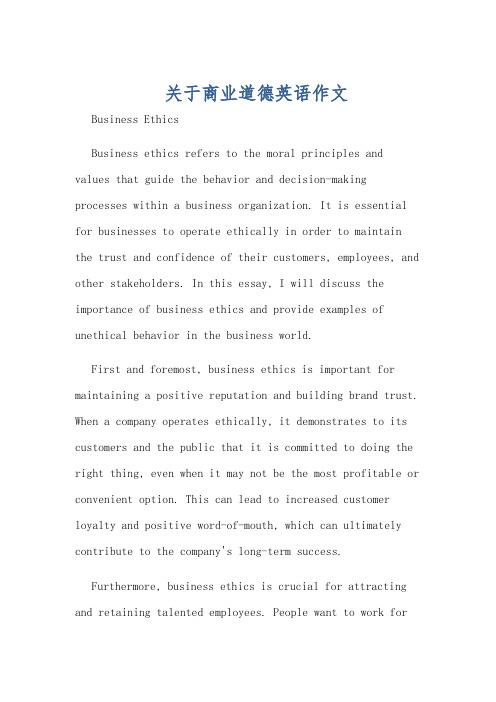
关于商业道德英语作文Business EthicsBusiness ethics refers to the moral principles and values that guide the behavior and decision-making processes within a business organization. It is essential for businesses to operate ethically in order to maintain the trust and confidence of their customers, employees, and other stakeholders. In this essay, I will discuss the importance of business ethics and provide examples of unethical behavior in the business world.First and foremost, business ethics is important for maintaining a positive reputation and building brand trust. When a company operates ethically, it demonstrates to its customers and the public that it is committed to doing the right thing, even when it may not be the most profitable or convenient option. This can lead to increased customer loyalty and positive word-of-mouth, which can ultimately contribute to the company's long-term success.Furthermore, business ethics is crucial for attracting and retaining talented employees. People want to work forcompanies that align with their own values and beliefs. When a company is known for its ethical practices, it is more likely to attract top talent and retain its current employees. This can lead to a more productive and engaged workforce, which can positively impact the company's bottom line.In addition, operating ethically can also help a company avoid legal issues and regulatory scrutiny. Unethical behavior, such as fraud, bribery, or environmental violations, can lead to costly lawsuits, fines, and damage to the company's reputation. By adhering to ethical standards, a company can minimize its legal and financial risks and focus on its core business operations.Despite the importance of business ethics, there have been numerous examples of unethical behavior in the business world. For instance, the Enron scandal in 2001 involved accounting fraud and corruption, leading to the company's bankruptcy and the loss of thousands of jobs. More recently, the Wells Fargo scandal in 2016 revealedthat employees had opened millions of fake accounts to meetsales targets, resulting in a major public relations crisis for the bank.In conclusion, business ethics is essential for maintaining a positive reputation, attracting and retaining talented employees, and avoiding legal issues. It is important for companies to prioritize ethical behavior inall aspects of their operations, from their treatment of employees to their interactions with customers and the broader community. By doing so, they can build trust and credibility, which can ultimately contribute to their long-term success.商业道德商业道德是指指导企业组织行为和决策过程的道德原则和价值观。
商业道德的重要性英语作文
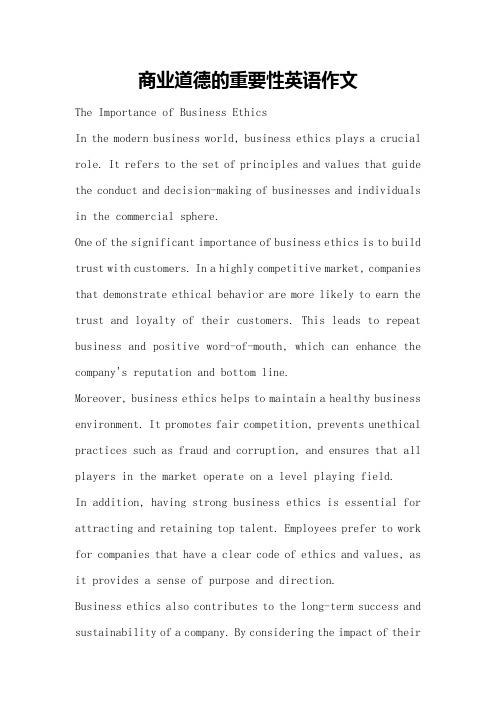
商业道德的重要性英语作文The Importance of Business EthicsIn the modern business world, business ethics plays a crucial role. It refers to the set of principles and values that guide the conduct and decision-making of businesses and individuals in the commercial sphere.One of the significant importance of business ethics is to build trust with customers. In a highly competitive market, companies that demonstrate ethical behavior are more likely to earn the trust and loyalty of their customers. This leads to repeat business and positive word-of-mouth, which can enhance the company's reputation and bottom line.Moreover, business ethics helps to maintain a healthy business environment. It promotes fair competition, prevents unethical practices such as fraud and corruption, and ensures that all players in the market operate on a level playing field.In addition, having strong business ethics is essential for attracting and retaining top talent. Employees prefer to work for companies that have a clear code of ethics and values, as it provides a sense of purpose and direction.Business ethics also contributes to the long-term success and sustainability of a company. By considering the impact of theiractions on various stakeholders, including the community and the environment, businesses can make more informed and responsible decisions.Furthermore, it is not only beneficial for companies but also for the society as a whole. Ethical business practices can lead to greater social welfare and economic development.In conclusion, business ethics is of utmost importance in the contemporary business landscape. It is essential for building trust, maintaining a healthy business environment, attracting talent, ensuring long-term success, and contributing to the well-being of society.中文翻译:商业道德的重要性在现代商业世界中,商业道德起着至关重要的作用。
business ethics的英语作文
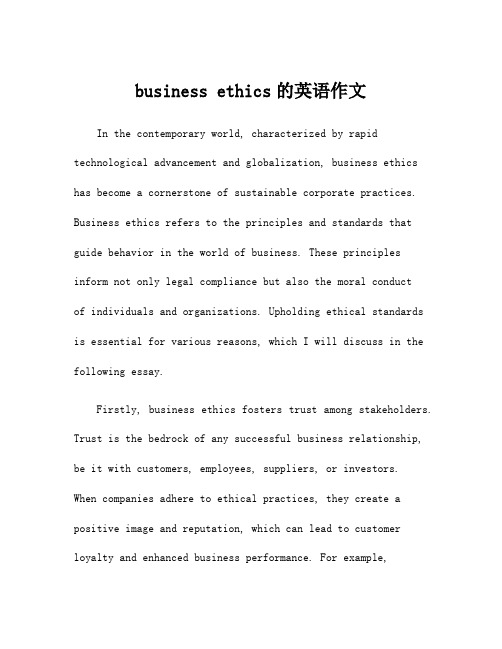
business ethics的英语作文In the contemporary world, characterized by rapid technological advancement and globalization, business ethics has become a cornerstone of sustainable corporate practices. Business ethics refers to the principles and standards that guide behavior in the world of business. These principles inform not only legal compliance but also the moral conductof individuals and organizations. Upholding ethical standards is essential for various reasons, which I will discuss in the following essay.Firstly, business ethics fosters trust among stakeholders. Trust is the bedrock of any successful business relationship, be it with customers, employees, suppliers, or investors. When companies adhere to ethical practices, they create a positive image and reputation, which can lead to customer loyalty and enhanced business performance. For example,businesses that are transparent about their sourcing methods, labor practices, and environmental impacts are more likely to win customer trust, leading to higher sales and long-term sustainability. In contrast, companies engulfed in scandals or unethical practices may face public backlash, leading to decreased customer loyalty and potential financial ruin.Secondly, ethical business practices promote a positive workplace culture. Employees are more likely to be motivated, engaged, and productive when they work in an environment that prioritizes integrity and fairness. Companies that advocate for ethical behavior are often seen as more attractive employers, helping them attract and retain top talent. Furthermore, a strong ethical foundation can mitigate risks associated with workplace misconduct, such as fraud or harassment, thereby promoting a safer and more respectful work environment.Moreover, business ethics and corporate social responsibility (CSR) are interconnected. Businesses that prioritize ethical practices often find themselves more aligned with the principles of CSR, which involve acknowledging the impact of their operations on society and the environment. By integrating ethical considerations into their business strategies, organizations can contribute to social good while also enhancing their market position. For example, companies that invest in sustainable practices not only help to protect the environment but also appeal to a growing demographic of socially conscious consumers.In conclusion, the role of business ethics in today’s corporate environment cannot be overstated. Upholding ethical standards fosters trust among stakeholders, enhances workplace culture, and aligns businesses with the broader goals of social responsibility. As the business landscape continues to evolve, organizations committed to ethical practices will not only navigate challenges more effectivelybut also contribute positively to society and the economy at large. In essence, ethics in business is not merely a regulatory requirement; it is a vital component of long-term success and sustainability.。
经商和道德 Business and Ethics (大学英语作文)
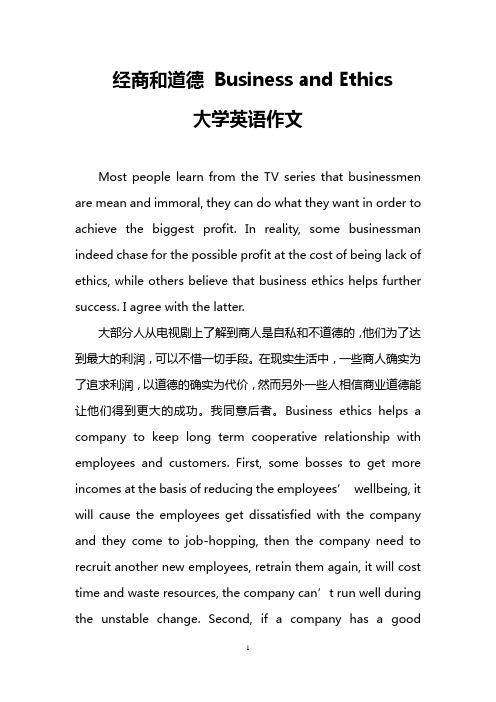
经商和道德Business and Ethics大学英语作文Most people learn from the TV series that businessmen are mean and immoral, they can do what they want in order to achieve the biggest profit. In reality, some businessman indeed chase for the possible profit at the cost of being lack of ethics, while others believe that business ethics helps further success. I agree with the latter.大部分人从电视剧上了解到商人是自私和不道德的,他们为了达到最大的利润,可以不惜一切手段。
在现实生活中,一些商人确实为了追求利润,以道德的确实为代价,然而另外一些人相信商业道德能让他们得到更大的成功。
我同意后者。
Business ethics helps a company to keep long term cooperative relationship with employees and customers. First, some bosses to get more incomes at the basis of reducing the employees’wellbeing, it will cause the employees get dissatisfied with the company and they come to job-hopping, then the company need to recruit another new employees, retrain them again, it will cost time and waste resources, the company can’t run well during the unstable change. Second, if a company has a goodreputation, customers are willing to buy their products and keep business with the company. On the contrary, no one is willing to buy the company’s products which is immoral, the product may be not in good quality, it will do harm to people’s health.商业道德能让一个公司和员工以及顾客保持长期的合作关系。
商业伦理英文作文
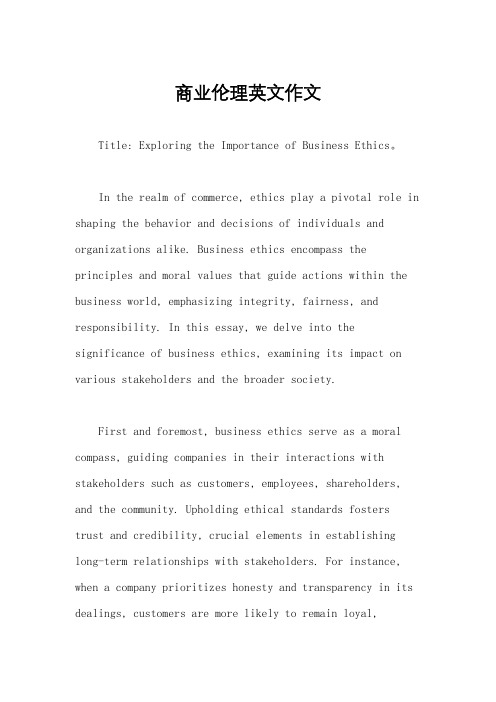
商业伦理英文作文Title: Exploring the Importance of Business Ethics。
In the realm of commerce, ethics play a pivotal role in shaping the behavior and decisions of individuals and organizations alike. Business ethics encompass the principles and moral values that guide actions within the business world, emphasizing integrity, fairness, and responsibility. In this essay, we delve into the significance of business ethics, examining its impact on various stakeholders and the broader society.First and foremost, business ethics serve as a moral compass, guiding companies in their interactions with stakeholders such as customers, employees, shareholders, and the community. Upholding ethical standards fosterstrust and credibility, crucial elements in establishing long-term relationships with stakeholders. For instance, when a company prioritizes honesty and transparency in its dealings, customers are more likely to remain loyal,knowing that their interests are valued and protected.Moreover, ethical conduct contributes to a positive corporate culture, promoting mutual respect and dignity among employees. A workplace that prioritizes fairness and equality not only enhances employee morale but alsoattracts top talent. When individuals feel valued and respected, they are more motivated to contribute their best efforts towards organizational goals, leading to increased productivity and innovation.From a broader perspective, adherence to ethical principles fosters sustainable business practices that benefit both the environment and society. Companies that prioritize environmental stewardship and social responsibility not only minimize their ecological footprint but also contribute to the well-being of communities. By investing in initiatives such as renewable energy, waste reduction, and community development, businesses can create shared value, aligning financial success with societal progress.Furthermore, ethical behavior mitigates risks and safeguards corporate reputation. In an era of heightened transparency and accountability, any deviation from ethical standards can lead to severe repercussions, including legal consequences and reputational damage. By proactively addressing ethical dilemmas and adhering to established codes of conduct, companies can mitigate risks and protect their brand integrity in the long run.Nevertheless, navigating ethical challenges in the business world is not always straightforward. In today's complex and interconnected global economy, companies often face competing interests and conflicting values, requiring careful deliberation and ethical judgment. Balancing financial objectives with ethical considerations can be particularly challenging, especially in highly competitive industries where profit margins are tight.Moreover, cultural differences and varying legal frameworks further complicate ethical decision-making, highlighting the importance of cross-cultural understanding and ethical leadership. While certain practices may beacceptable in one cultural context, they may be deemed unethical or even illegal in another. Thus, fostering a culture of ethical awareness and accountability isessential for navigating the intricacies of a globalized marketplace.In conclusion, business ethics serve as the foundation for responsible and sustainable business practices, shaping the conduct of individuals and organizations in the pursuit of economic prosperity. By upholding ethical standards, companies can build trust, foster innovation, and create value for all stakeholders. As we navigate the complexities of the modern business landscape, let us remain steadfast in our commitment to ethical integrity, recognizing that true success is not merely measured in financial terms but in the positive impact we make on society and the world at large.。
关于商业道德英语作文
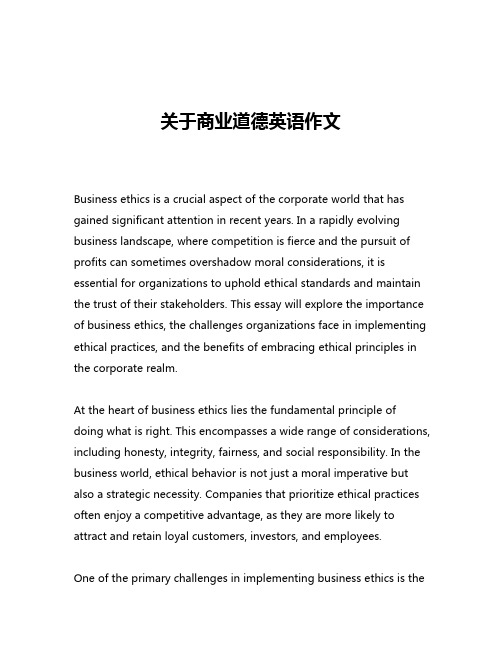
关于商业道德英语作文Business ethics is a crucial aspect of the corporate world that has gained significant attention in recent years. In a rapidly evolving business landscape, where competition is fierce and the pursuit of profits can sometimes overshadow moral considerations, it is essential for organizations to uphold ethical standards and maintain the trust of their stakeholders. This essay will explore the importance of business ethics, the challenges organizations face in implementing ethical practices, and the benefits of embracing ethical principles in the corporate realm.At the heart of business ethics lies the fundamental principle of doing what is right. This encompasses a wide range of considerations, including honesty, integrity, fairness, and social responsibility. In the business world, ethical behavior is not just a moral imperative but also a strategic necessity. Companies that prioritize ethical practices often enjoy a competitive advantage, as they are more likely to attract and retain loyal customers, investors, and employees.One of the primary challenges in implementing business ethics is thepotential conflict between short-term financial goals and long-term ethical considerations. In a market driven by the pursuit of profits, organizations may be tempted to cut corners or engage in unethical practices to achieve immediate gains. However, this approach often backfires, as unethical behavior can lead to legal consequences, reputational damage, and the erosion of public trust.To address this challenge, organizations must cultivate a culture of ethical decision-making. This begins with strong leadership that sets the tone from the top and ensures that ethical principles are embedded into the company's core values and operational procedures. Effective communication, employee training, and robust compliance systems are also essential in promoting ethical behavior throughout the organization.Another significant challenge in implementing business ethics is the complexity of the modern business environment. With globalization, technological advancements, and evolving regulatory frameworks, organizations must navigate a constantly changing landscape of ethical considerations. Issues such as environmental sustainability, data privacy, and human rights can present unique ethical dilemmas that require careful deliberation and nuanced solutions.To overcome these challenges, organizations must adopt a proactive and adaptive approach to business ethics. This involves continuouslymonitoring the evolving business landscape, engaging with stakeholders, and staying informed about emerging ethical issues. By anticipating and addressing potential ethical concerns, companies can mitigate risks and position themselves as responsible corporate citizens.The benefits of embracing ethical principles in the business world are manifold. Firstly, ethical behavior can enhance a company's reputation and brand image, making it more attractive to customers, investors, and potential employees. Ethical companies are often perceived as trustworthy, socially responsible, and committed to the well-being of their stakeholders.Secondly, ethical practices can contribute to long-term financial sustainability. By fostering a culture of integrity and transparency, organizations can build strong relationships with their stakeholders, reduce the risk of legal and regulatory issues, and avoid the costly consequences of unethical behavior.Moreover, ethical practices can boost employee morale and engagement. When employees feel that their organization operates with a strong ethical compass, they are more likely to be motivated, committed, and loyal. This can lead to improved productivity, reduced turnover, and a more positive work environment.Finally, embracing business ethics can have a positive impact on the broader community and society. Companies that prioritize social responsibility and environmental sustainability can contribute to the well-being of the communities in which they operate, and can serve as role models for other organizations to follow.In conclusion, business ethics is a critical component of corporate success and sustainability. By cultivating a culture of ethical behavior, organizations can build trust, enhance their reputation, and contribute to the greater good. While implementing ethical practices can present challenges, the long-term benefits of doing so far outweigh the short-term costs. As the business world continues to evolve, it is incumbent upon organizations to uphold the highest ethical standards and to lead the way in promoting responsible and sustainable business practices.。
商业伦理的重要性英文作文
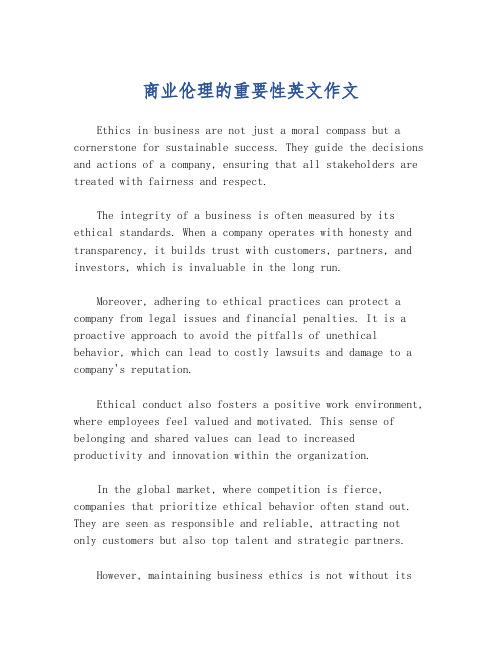
商业伦理的重要性英文作文Ethics in business are not just a moral compass but a cornerstone for sustainable success. They guide the decisions and actions of a company, ensuring that all stakeholders are treated with fairness and respect.The integrity of a business is often measured by its ethical standards. When a company operates with honesty and transparency, it builds trust with customers, partners, and investors, which is invaluable in the long run.Moreover, adhering to ethical practices can protect a company from legal issues and financial penalties. It is a proactive approach to avoid the pitfalls of unethical behavior, which can lead to costly lawsuits and damage to a company's reputation.Ethical conduct also fosters a positive work environment, where employees feel valued and motivated. This sense of belonging and shared values can lead to increasedproductivity and innovation within the organization.In the global market, where competition is fierce, companies that prioritize ethical behavior often stand out. They are seen as responsible and reliable, attracting not only customers but also top talent and strategic partners.However, maintaining business ethics is not without itschallenges. It requires constant vigilance and a commitment to doing the right thing, even when it might be more profitable to take a shortcut.In conclusion, the importance of business ethics cannot be overstated. They are the bedrock of a company's reputation and a key driver of its long-term viability. As the world becomes increasingly interconnected, ethical practices will only become more critical to the success of any enterprise.。
- 1、下载文档前请自行甄别文档内容的完整性,平台不提供额外的编辑、内容补充、找答案等附加服务。
- 2、"仅部分预览"的文档,不可在线预览部分如存在完整性等问题,可反馈申请退款(可完整预览的文档不适用该条件!)。
- 3、如文档侵犯您的权益,请联系客服反馈,我们会尽快为您处理(人工客服工作时间:9:00-18:30)。
经商和道德Busi ness and Ethics
大学英语作文
Most people lear n from the TV series that bus in essme n are mea n and immoral, they can do what they want in order to achieve the biggest profit. In reality, some bus in essma n in deed chase for the possible profit at the cost of being lack of ethics, while others believe that bus in ess ethics helps further success. I agree with the latter.
大部分人从电视剧上了解到商人是自私和不道德的,他们为了达到最大的利润,可以不惜一切手段。
在现实生活中,一些商人确实为了追求利润,以道德的确实为代价,然而另外一些人相信商业道德能让他们得到更大的成功。
我同意后者。
Bus in ess ethics helps a compa ny to keep long term cooperative relati on ship with employees and customers. First, some bosses to get more in comes at the basis of reduc ing the employees ' wellbe in g, it will cause the employees get dissatisfied with the company and they come to job-hopping, then the company need to recruit ano ther new employees, retrain them aga in, it will cost time and waste resources, the company can ' t run well during the unstable
change. Second, if a company has a good
reputation, customers are willing to buy their products and
keep bus in ess with the compa ny. On the con trary, no one is willing to buy the company ' s products which is immoral, the product may be not in good quality, it will do harm to people ' s health.商业道德能让一个公司和员工以及顾客保持长期的合作关系。
第一,一些老板为了赚更多钱,减少了员工的福利,这样会引起员工对公司的不满,员工会想要跳槽,这样公司就要招聘新员工,重新培训,很花时间和浪费资源,在变动期间,公司无法正常运作。
第二,如果一个公司有声望,顾客就会愿意买这个公司的产品,和它保持合作。
相反的,没有人愿意买一个不道德公司的产品,那些产品可能会质量不好,对人们的健康有害。
Today, the world is full of competiti on, if a compa ny wants to get wi n-win situati on, the
boss must have the sense of ethics, with it, the employees and customers will en sure the compa ny big profit. 今天,世界充满了竞争,如果一个公司想要处于双赢的状态,老板就必须要有道德意识,只有这有,员工和顾客才能给他们带来更大的利润。
